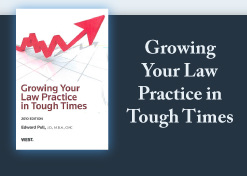|
An Estate Plan Is a Succession Plan
Is a Retirement Plan
In a recent LawBiz® Tip we discussed the necessity for every solo and small firm lawyer to have an estate plan that provides for financial security after leaving practice.
However, structuring insurance, preparing a will, structuring your tax liability and designating a practice conservator – all essential elements of a law practice estate plan – are just part of a planning continuum that you need to undertake in anticipation of your "second season" as well as unexpected demise.
The next related element is a succession plan. If the practice is not sold, the best succession alternative is grooming a successor brought on board as an associate or a lateral partner. Ideally this succession plan can be structured to transition over a period of up to five years as client responsibilities gradually transition to the new lawyer. During this period, there can be ongoing conversations with key clients about the upcoming transition, an opportunity to forge new ties between the successor and both current and new contacts at the client, and sufficient planning to ensure that the new lawyer is completely up to speed on what the client needs and expects.
Preparing for this kind of smooth transition can ease problems over the issues of valuation and payment of goodwill when the time comes to turn the practice over to a successor.
Then there is the practical need for a retirement plan. The focus is not on practice management or on material assets – instead, it is on personal satisfaction, self-worth and well-being. All successful people are focused and passionate about what they do. If they want to pursue different interests, it is not that they wish to have a life of leisure – it reflects a greater desire to pursue their other passions.
When developing a plan for your second season, ask yourself some questions. What do you want to do with your life once you leave practice? Do you want to quit working and retire, or start a new adventure? Can you achieve the same objective without leaving the practice of law? Leaving your current practice by retiring is an emotional process. You must want to do so, and a successful transition will require all the traits that defined your success as a lawyer: motivation, acceptance of risk, resiliency and commitment. Each person's approach will be unique, and can change over time. Making a decision does not have to mean that you've burned bridges to your past life, or that you cannot change again in the future.
Some lawyers at this point may say that all this planning is more bother than it is worth, and intend to stay in practice until they "die with their boots on." If so, they are extremely short-sighted. In effect they are throwing away the value of their practices, cheating their heirs and making an unrecognized gift to strangers. Existing clients have to go somewhere and the lawyers who pick them up will be strangers to the decedent, and beneficiaries of the deceased lawyer's stupidity.
|
|

Following the worst economic crisis since the Great
Depression, and facing a sea change in clients' demands
and expectations, law firms must respond and adapt
quickly and effectively. Law firms must choose the kind of
law practice they will be; the marketing and business
development tactics they will use; the overhead that is
critical to their functioning; how to price, bill and collect
for services; and how to manage the cash flow cycle.
Success lies in identifying and capturing the right kinds of
clients, providing the services those clients need in ways
that add value, and ensuring prompt payment and the
ability to grow profits. This book, based on the
experiences of Ed and his clients over 20 years of
coaching and consulting, provides the keys to
successfully thriving in the new era.
Now Available
Special New Release Price: $79
Regular Price: $120
Call or Order Online at:
1-800-837-5880
www.lawbiz.com





|

|
|
|

Personal Commentary
I'm on the road again. I spent the last few days in Washington, D.C. at the joint meeting of the College of Law Practice Management (of which I'm a Fellow) and the ABA's Law Practice Management Section. The conversation was stimulating and re-connecting with some of the best minds in law practice management circles was a joy.
This week I'm in New York in meetings about another book and another session with my coach, with whom I spent the last week about accelerating the value I provide to successful lawyers and small firm managing partners. Look for a new audio product, 8 Steps to Success and Increased Profit.
Ed Poll
lawbiz.com
lawbizblog.com
www.LawBizForum.com
800-837-5880
Please use the URL below to link to this issue:
www.lawbiz.com/nlimages/tip-10-26-10.html
|

|

What Readers Are Saying...
"No matter how you slice it, there is
no substitute for wisdom and
experience. Ed Poll has
demonstrated both in this eyeopening
book about the essential
elements of running a profitable law
practice. He provides practical
wisdom along with simple ways to
adopt and incorporate best practices
for each. After explaining the pros
and cons of every decision, he makes
recommendations and provides
useful guides disguised as key
principles. Buy the book so you too
can access Ed's wisdom and
experience. It's worth much more
than the investment."
STEWART L. LEVINE. ESQ.,
FOUNDER, RESOLUTIONWORKS
AUTHOR, GETTING TO RESOLUTION;
THE BOOK OF AGREEMENT AND
COLLABORATION 2.0
|

|

|






